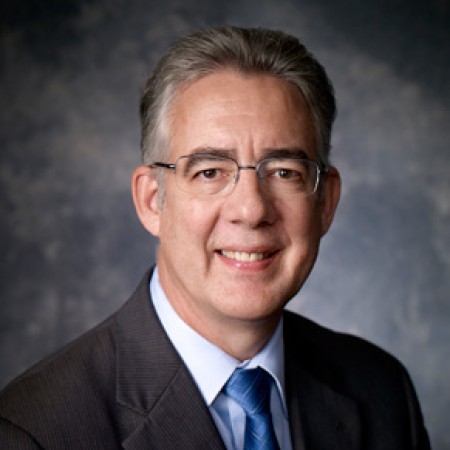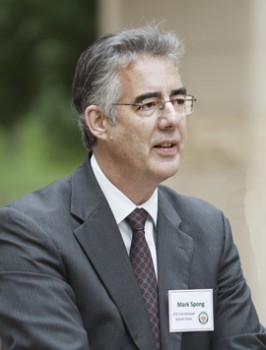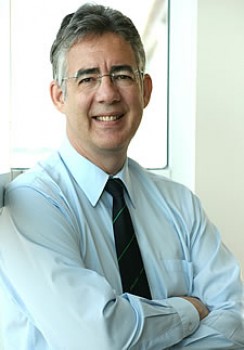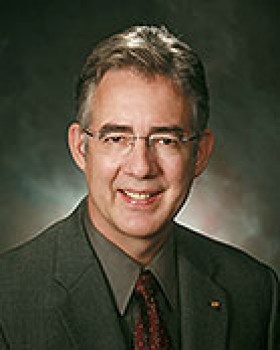D.Sc. - Systems Science and Mathematics
Washington University, St. Louis, MO - 1981

Mark Spong
Excellence in Education Chair
Professor - System Engineering
Professional Preparation
M.S. - Systems Science and Mathematics
Washington University, St. Louis, MO - 1979
Washington University, St. Louis, MO - 1979
M.S. - Mathematics
New Mexico State University, Las Cruces, NM - 1977
New Mexico State University, Las Cruces, NM - 1977
B.S. - Mathematics and Physics
Hiram college, Hiram, OH - 1975
Hiram college, Hiram, OH - 1975
Research Areas
Mark W. Spong
Robotics, Control Systems, TeleoperationPublications
Li, W.; Spong, M. W.; Stability of General Coupled Inertial Agents, IEEE Transactions on Automatic Control, Volume: PP, Issue: 99, pp. 1-1, 2010. 2010 - Publication
Gregg, R.D.; Spong, M.W.; Bringing the compass-gait bipedal walker to three dimensions, IEEE/RSJ International Conference on Intelligent Robots and Systems, 2009; IROS 2009, pp. 4469 – 4474, 2009. 2009 - Publication
Rodriguez-Seda, E.J.; Spong, M.W.; A time-varying wave impedance approach for transparency compensation in bilateral teleoperation IEEE/RSJ International Conference on Intelligent Robots and Systems, 2009, IROS 2009, pp. 4609 – 4615, 2009. 2009 - Publication
Srivastava, K.; Stipanovic, D.M.; Spong, M.W.; On a stochastic robotic surveillance problem
Proceedings of the 48th IEEE Conference on Decision and Control, CDC/CCC 2009, pp. 8567-8574, 2009. 2009 - Publication
Palafox, O.M.; Spong, M.W.; Bilateral teleoperation of a formation of nonholonomic mobile robots under constant time delay, IEEE/RSJ International Conference on Intelligent Robots and Systems, 2009; IROS 2009, pp. 2821-2826, 2009. 2009 - Publication
Rodriguez-Seda, E. J.; Troy, J. J.; Erignac, C. A.; Murray, P.; Stipanovic, D. M.; Spong, M. W.; Bilateral Teleoperation of Multiple Mobile Agents: Coordinated Motion and Collision Avoidance, IEEE Transactions on Control Systems Technology, Vol. 99, No. 1, pp. 1-1, 2009. 2009 - Publication
Igarashi, Y.; Hatanaka, T.; Fujita, M.; Spong, M.W.; Passivity-Based Attitude Synchronization in SE(3), IEEE Transactions on Control Systems Technology, Volume: 17, No. 5, pp. 1119-1134, 2009. 2009 - Publication
Gregg, R.D.; Spong, M.W.; Reduction-based control of branched chains: Application to three-dimensional bipedal torso robots, Proceedings of the 48th IEEE Conference on Decision and Control, CDC/CCC 2009, pp. 8166-8173, 2009 2009 - Publication
Appointments
Dean, Erik Jonsson School of Engineering and Computer Science/Lars Magnus Ericsson Chair in Electrical Engineering/Excellence in Education Chair
University of Texas at Dallas [2008–Present]
University of Texas at Dallas [2008–Present]
Founder and President.
Mechatronic Systems, Incorporated [1996–2005]
Mechatronic Systems, Incorporated [1996–2005]
Donald Biggar Willett Professor of Engineering/Professor, Electrical and Computer Engineering/Research Professor, Coordinated Science Laboratory/Research Professor, Information Trust Institute
University of Illinois at Urbana-Champaign [1984–2008]
University of Illinois at Urbana-Champaign [1984–2008]
Assistant Professor
Cornell University [1982–1984]
Cornell University [1982–1984]
Assistant Professor
Lehigh University, Bethlehem [1981–1982]
Lehigh University, Bethlehem [1981–1982]
Projects
What's Passivity Got to Do With it?
2006–2006 What's Passivity Got to Do With it?, Dynamic Walking Workshop, Ann Arbor, MI, May 6-8, 2006.Coordination of Multi-Agent Systems
2006–2006 Coordination of Multi-Agent Systems, Keynote Address at the IASTED International Conference on Control and Applications, Montreal, Canada, May 24-26, 2006.Project-Based Control Education
2006–2006 Project-Based Control Education, Plenary Lecture at the 7th IFAC Symposium on Advances in Control Education, Madrid, Spain, June, 21-23, 2006.Synchronization of Multiple Lagrangian Systems
2006–2006 Synchronization of Multiple Lagrangian Systems, Plenary Lecture at the 3rd IFAC Workshop on Lagrangian and Hamiltonian Methods for Nonlinear Control (LHMNLC'06), Nagoya, Japan, July 19-21, 2006.Passivity-Based Control of Multi-Agent Systems
2006–2006 Passivity-Based Control of Multi-Agent Systems, International Symposium on Advanced Robotics and Machine Intelligence, Beijing, China, October, 2006.Additional Information
Awards
- 2011 IEEE RAS Pioneer Award
- IROS Fumio Harashima Award for Innovative Technologies, 2007
- Achievement Hall of Fame, Champion High School, Warren, OH, 2007
- John R. Ragazzini Award, American Automatic Control Council, 2004
- Named Donald Biggar Willett Professor of Engineering, University of Illinois 2003
- O. Hugo Schuck Award, American Automatic Control Council, 2002 and 2009
- Distinguished Member Award, IEEE Control Systems Society, 2002
- Alexander von Humboldt Foundation Senior U.S. Scientist Research Award, 1999
- IEEE Third Millennium Medal, 2000
- Fellow of the IEEE, 1996
- NSF Research Initiation Award, 1982
- Phi Beta Kappa, 1975
IEEE Activities
- President, IEEE Control Systems Society, 2005
- Vice President for Publication Activities, IEEE Control Systems Society, 2000-2002
- Board of Governors, IEEE Control Systems Society, 1994-2002 and 2004-2007
- Executive Committee, IEEE Control Systems Society, 1997-2002 and 2004-2007
- Nominating Committee, IEEE Control Systems Society, 2006-2008
- General Chair, 2010 IEEE Conference on Decision and Control
- General Chair, 2001 IEEE Conference on Control Applications
Patents
Method and System of Compensating Wave Reections in Transmissions Lines", U.S. Patent 7245102 issued June, 2007. Joint with R. Ortega.Bilateral Teleoperation over Communication Media," Invention Disclosure, University of Illinois, January 7, 2004. Joint with N. Chopra and R. Lozano.
News Articles
Dean Touts Robotics Projects for Student Engineers
Robotics makes a particularly good topic for student projects, according to UT Dallas engineering and computer science Dean Mark W. Spong, and he cites two examples: robotic air hockey and robotic chess. Such projects are opportunities for students to use much of what they’ve learned in the classroom, applying knowledge and theory in the same ways they will on the job after graduation, he said. “They have to do design, they have to do systems integration, sensing, control, programming, all of the components that go into real engineered systems like automobiles, aircraft and telecommunications systems,” he added.Engineering Dean Honored for Robotics Research
 Dr. Mark W. Spong of UT Dallas has received the 2011 Pioneer in Robotics and Automation Award from the IEEE Robotics and Automation Society for groundbreaking robotics research that is widely regarded for its depth, breadth and practical applicability. The Pioneer Award is the organization’s highest honor, recognizing individuals who have initiated new areas of research, development or engineering that have had a significant impact on the development of robotics and automation. The society cited Spong for “fundamental contributions to the foundations of control of robots and teleoperators, and for contributions to robotics education.” Spong is dean of the University’s Erik Jonsson School of Engineering and Computer Science, where he holds both the Lars Magnus Ericsson Chair and the Excellence in Education Chair.
Dr. Mark W. Spong of UT Dallas has received the 2011 Pioneer in Robotics and Automation Award from the IEEE Robotics and Automation Society for groundbreaking robotics research that is widely regarded for its depth, breadth and practical applicability. The Pioneer Award is the organization’s highest honor, recognizing individuals who have initiated new areas of research, development or engineering that have had a significant impact on the development of robotics and automation. The society cited Spong for “fundamental contributions to the foundations of control of robots and teleoperators, and for contributions to robotics education.” Spong is dean of the University’s Erik Jonsson School of Engineering and Computer Science, where he holds both the Lars Magnus Ericsson Chair and the Excellence in Education Chair.
Dean to Deliver Keynote at Robotics Conference
 Just 50 years ago, robots were largely the stuff of science fiction rather than the fixtures they are today in factories, space exploration, hospitals, the military and a host of other areas. Reflecting on the achievements of the field and the broad impact of robotics on society, this year’s IEEE International Conference on Robotics and Automation features a set of lectures by leading authorities in the field, including UT Dallas Dean of Engineering and Computer Science Mark W. Spong, who has spent his entire career working to transform robotics from fiction to fact. Spong and his students have done seminal work in several areas of robotics, including teleoperation, adaptive control and force control. His keynote lecture Wednesday will address the interplay between robotics and control theory. Other keynote speakers will address topics such as robot motion planning, computer vision, machine learning and medical robotics.
Just 50 years ago, robots were largely the stuff of science fiction rather than the fixtures they are today in factories, space exploration, hospitals, the military and a host of other areas. Reflecting on the achievements of the field and the broad impact of robotics on society, this year’s IEEE International Conference on Robotics and Automation features a set of lectures by leading authorities in the field, including UT Dallas Dean of Engineering and Computer Science Mark W. Spong, who has spent his entire career working to transform robotics from fiction to fact. Spong and his students have done seminal work in several areas of robotics, including teleoperation, adaptive control and force control. His keynote lecture Wednesday will address the interplay between robotics and control theory. Other keynote speakers will address topics such as robot motion planning, computer vision, machine learning and medical robotics.
Award-Winning Paper Looks at Evolution of Gentler Robots
 Hammering a nail without wrecking a thumb is a dicey proposition for most. But imagine having the ability to control a robot at a construction site on the surface of the moon, or welding on the ocean floor. Dr. Mark Spong, incoming dean of the UT Dallas Erik Jonsson School of Engineering and Computer Science, published a paper with his former Ph.D. student, Dr. Peter Hokayem, now a postdoctoral fellow at the University of Würzburg, Germany, about the history of bilateral teleoperation—or how to control a kinder, gentler robot. The history survey was published in 2006 in Automatica, the flagship journal of the International Federation of Automatic Control (IFAC). Spong and Hokayem’s history survey was recently named the “Automatica Best Paper” in the survey/tutorial category. They will receive the award at the IFAC Triennial World Congress, which will be held in July in Seoul, South Korea.
Hammering a nail without wrecking a thumb is a dicey proposition for most. But imagine having the ability to control a robot at a construction site on the surface of the moon, or welding on the ocean floor. Dr. Mark Spong, incoming dean of the UT Dallas Erik Jonsson School of Engineering and Computer Science, published a paper with his former Ph.D. student, Dr. Peter Hokayem, now a postdoctoral fellow at the University of Würzburg, Germany, about the history of bilateral teleoperation—or how to control a kinder, gentler robot. The history survey was published in 2006 in Automatica, the flagship journal of the International Federation of Automatic Control (IFAC). Spong and Hokayem’s history survey was recently named the “Automatica Best Paper” in the survey/tutorial category. They will receive the award at the IFAC Triennial World Congress, which will be held in July in Seoul, South Korea.
New Dean Takes Expertise in Robotics to Russia
 Dr. Mark W. Spong is a pre-eminent robotics and engineering researcher in high demand—both at home and abroad. Stateside, he recently accepted the deanship of UT Dallas’ Erik Jonsson School of Engineering and Computer Science, where he will start in mid-August. But before that, he boarded a plane bound for St. Petersburg, Russia, where he delivered the opening plenary address at the European Mechanics Society’s Nonlinear Oscillations Conference (ENOC). Spong, currently a professor in the Department of Electrical and Computer Engineering at the University of Illinois at Urbana-Champaign, is a noted expert on robotic control systems.
Dr. Mark W. Spong is a pre-eminent robotics and engineering researcher in high demand—both at home and abroad. Stateside, he recently accepted the deanship of UT Dallas’ Erik Jonsson School of Engineering and Computer Science, where he will start in mid-August. But before that, he boarded a plane bound for St. Petersburg, Russia, where he delivered the opening plenary address at the European Mechanics Society’s Nonlinear Oscillations Conference (ENOC). Spong, currently a professor in the Department of Electrical and Computer Engineering at the University of Illinois at Urbana-Champaign, is a noted expert on robotic control systems.